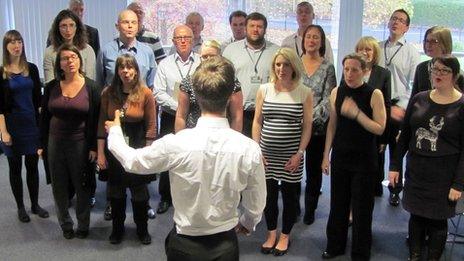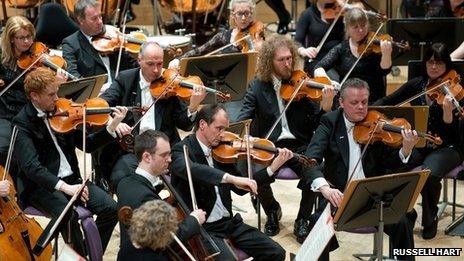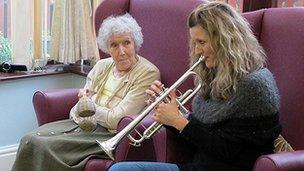The Halle orchestra get creative to make music pay
- Published

Halle choir leaders have been training six companies for the competition
The Halle orchestra is taking a leaf out of celebrity choirmaster Gareth Malone's book and holding its first corporate choir competition. The Halle has trained six office choirs in an attempt to use its musical expertise to make up for funding cuts.
In technology companies, finance firms and transport offices across the north-west of England, unusual sounds have been coming from meeting rooms during lunch breaks in recent months.
The sound of singing is unusual, that is, compared with the normal office din of rattling keyboards and conversations about contracts.
The six office choirs, who have all been coached by the Halle, will hope to be on song when they do battle at The Halle's corporate choir contest, external in Manchester on Friday.
The prize is an opportunity to perform with the full orchestra and it is all part of an attempt by the Halle to find new ways of using its artistic excellence in making money.
The office choirs have essentially been teambuilding endeavours, with secretaries and senior executives coming together in (almost) perfect harmony.

The Halle is one of the UK's oldest symphony orchestras
If the companies involved decide they have benefited from the experience, the hope is that they may pay the Halle to continue running their choirs, or even become more deeply involved in sponsoring the orchestra.
Between 2010 and 2015, the Halle will lose between £400,000 and £500,000 from its local council and Arts Council England grants. It hopes to make up at least half of that shortfall through money-spinning schemes like the corporate choirs.
"Of course, at the moment when public finances are strained, we need to do everything we can to increase our income from earned sources," Halle chief executive John Summers says.
"We're trying to find lots of new ways to create income in order to support the art that we do."
Five of the six office choirs are relatively new, but the Halle has been training singers in the headquarters of technology firm Siemens for the past two years.
At their final rehearsal before the contest, 20 colleagues were being put through their paces by Halle choir leader Stuart Overington.
Caron Eastwood, a personal assistant who has worked for the company for 18 years, says she likes the choir sessions because she feels part of a group.
"It lifts you up for the day," she says. "The division I work in is quite small but it makes me feel as if I'm contributing to part of the company."
The company's financial director Robin Phillips is also in the choir. He says it brings together some colleagues who would never normally meet.
"It's been noticeable how you can motivate a team of people who are out of their comfort zone and through really tactical motivation and encouragement get them to a given goal," he says.
"It's been staggering how what we do with the choir can also relate to what we do at the office."
Using the arts in training and teambuilding is not new. But as grants are cut, more cultural organisations are thinking about new ways to use their artistic assets.
As well as the Halle, the London Symphony Orchestra, external runs choirs for City of London sponsors and the Royal Northern Sinfonia, external offers to visit offices to set up ukulele bands and tin whistle orchestras.
Meanwhile, theatres from the National Theatre, external to The Lowry, external in Salford offer actors and directors to train executives in the art of communication and leadership.

Manchester Camerata musicians are taking part in music therapy sessions in care homes
"Arts organisations are having to be more creative about who they talk to and how they talk to them in terms of getting money," says Philip Spedding, chief executive of Arts & Business, external.
"But for a number of them, it's about more than just that - it's about showing that the arts can make a difference in communities, and those communities can be where employees come together."
One company even got its employees to stage an opera as a teambuilding exercise, he says. But this form of fund-raising will not be open to all arts organisations.
"There are natural challenges for arts organisations in rural communities or in parts of the country where the business community has been particularly hard hit. Likewise there are artforms where this is more challenging."
Another orchestra using its artistic experience to raise revenue is the Manchester Camerata, external, which has signed a deal with private care home operator Care UK to provide musicians for music therapy sessions from next spring.
That follows a similar project in which players from the chamber orchestra have taken part in therapy sessions for dementia sufferers in and around Manchester.
Manchester Camerata chief executive Bob Riley says the sessions were set up because music can have health benefits for care home residents. He also realised the skills could have a commercial value.
"As a business, we are looking at different ways to increase and vary our sources of income," Mr Riley says. "We all know the environment we're in - there's not a tremendous amount of money in the public purse.
"And we know there are other ways we can be relevant in today's society. Health is one of them, [and] within schools, communities, all sorts of places, so we're trying to work with all sorts of partners who have a new perspective."
- Published20 November 2013
- Published13 June 2013
- Published15 May 2013
- Published5 October 2012
- Published6 October 2011